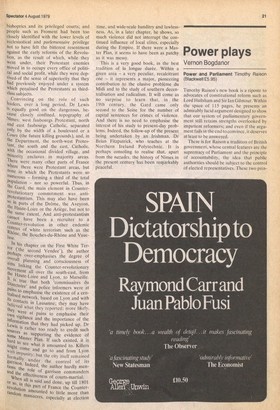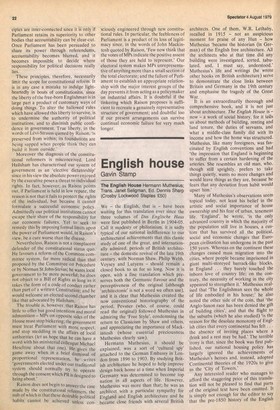Power plays
Vernon Bogdanor
Power and Parliament Timothy Raison (Blackwell £5.95) Timothy Raison's new book is a riposte to advocates of constitutional reform such as Lord Hailsham and Sir Ian Gilmour. Within the space of 115 pages, he presents an admirably lucid argument designed to show that our system of parliamentary government still retains strengths overlooked by impatient reformers; and even if the argument fails in the end to convince, it deserves at least to be answered.
There is for Raison a tradition of British government, whose central features are the supremacy of Parliament and the principle of accountability, the idea that public authorities should be subject to the control of elected representatives. These two prin ciples are inter-connected since it is only if Parliament retains its superiority to other bodies that accountability can be clear-cut. Once Parliament has been persuaded to share its power through referendums, accountability becomes blurred, and it becomes impossible to decide where responsibility for political decisions really lies.
These principles, therefore, necessarily limit the scope for constitutional reform. It is in any case a mistake to indulge lightheartedly in bouts of constitutionitis, since the liberty of the free-born Englishman is in large part a product of customary ways of doing things. To alter the hallowed rules which have allowed this liberty to survive, is to undermine the authority of political institutions, and to diminish public confidence in government. True liberty, in the words of Lovi-Strauss quoted by Raison, 'is preserved from within; its foundations are being sapped when people think they can build it from outside.'
Moreover the diagnosis of the constitutional reformers is misconceived. Lord Hailsham has characterised our system of government as an 'elective dictatorship' since in his view the absolute power enjoyed by the executive poses a threat to individual rights. In fact, however, as Raison points out, if Parliament is held in low repute, the reason is not that it fails to protect the rights of the individual, but because it cannot formulate a successful economic policy. Admittedly our political institutions cannot escape their share of the responsibility for our economic failures. Yet to seek to remedy this by imposing formal limits upon the power of Parliament would, in Raison's view, be a cure worse than the disease.
Nevertheless, Raison is not a complacent defender of the constitutional status quo. He favours a reform of the Commons committee system, far more radical than that proposed by the Committee on Procedure or by Norman St John-Stev-as; he wants local government to be more powerful; he does not object to a Bill of Rights as long as it takes the form of a code of conduct rather than part of a written Constitution; and he would welcome an elected second chamber like that advocated by Hailsham.
The trouble is, however, that Raison has little to offer but good intentions and moral admonition — MPs on opposite sides of the House must stop bickering; the government must treat Parliament with more respect, and stop meddling in the affairs of local authorities (let us hope that he can have a word with his ministerial colleague Michael Heseltine about that one). He gives the game away when. in a brief dismissal of proportional representation, he writes 'governments elected under our traditional system should normally try to operate through the consent which PR is designed to bring about.'
Raison does not begin to answer the case made by the constitutional reformers, the nub of which is that these desirable political habits cannot be achieved unless con sciously engineered through new constitutional rules. In particular, the feebleness of Parliament is a product of its loss of legitimacy since, in the words of John Mackintosh quoted by Raison, 'Few now think that the votes of MPs indicate the positive assent of those they are held to represent.' Our electoral system makes MPs unrepresentative of anything more than a small section of the total electorate; and the failure of Parliament to establish an appropriate relationship with the major interest groups of the day prevents it from acting as a policymaker on industrial affairs. It is doubtful if the tinkering which Raison proposes is sufficient to recreate a genuinely representative structure of government; and doubtful too if our present arrangements can survive continual economic failure for very much longer.



































 Previous page
Previous page